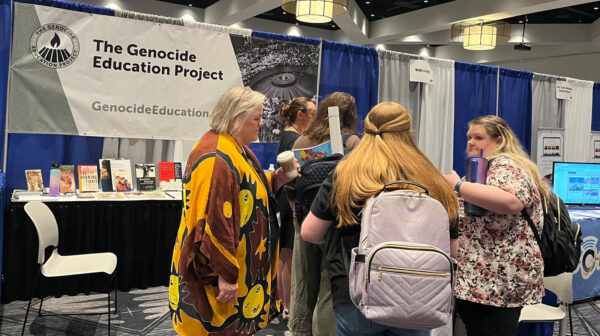by The Armenian Mirror-Spectator
By Araz Havan
Special to the Mirror-Spectator
BOSTON — For most Armenian Americans, it is important that public schools in their cities or towns teach the Armenian Genocide.
Read also
In Massachusetts, even though there is a state-wide mandate requiring the teaching of the Genocide as well as the Holocaust, instruction can vary depending on the municipality. A district might want to go beyond the basic curriculum materials — and currently there is a grant program for this — in order to bring “high-quality genocide education…meaningful learning experiences…and lead to long-term impact,” according to the Massachusetts Department of Education.
The grant can help with funding teacher development, purchasing or building curriculum, or relevant enrichment activities such as field trips, guest speakers, or other cultural events. Many districts who receive the grant reach out to the Genocide Education Project (GenEd).
Initially started in California in the early 2000’s, GenEd first began working with the San Francisco Unified School District as part of an initiative to bring Armenian Genocide education into the curriculum. Since then, the organization works to provide robust and meaningful teaching materials to school districts across the country.
With a focus on the Armenian Genocide, GenEd aims to show teachers how to incorporate the topics of genocide and human rights into the classroom. According to the organization’s website, the idea for its founding came from the absence of scholastic instruction about the Armenian Genocide by the Turkish government of the Ottoman Empire in 1915.
California and Massachusetts are a part of only 11 states that mandate some level of genocide education; GenEd hopes to reach more. However, that can be logistically difficult. The Teacher Fellowship Program in Armenia is one way that GenEd can address this issue. The fellowship provides professional development for middle and high school level educators through a trip to Armenia, where the teachers attend workshops and visit content-related sites.
A requirement for the Teaching Fellowship is that upon their return, “the Fellow has to produce a workshop that affects at least twenty teachers and a commitment to teaching about the Armenian Genocide,” said Seda Aghamianz, who serves as GenEd Administrator.
“We can’t be everywhere. Our job is to train teachers how to teach their kids. We get one teacher, that teacher in one year can teach up to a hundred kids. That’s just the first year,” said Aghamianz, on GenEd’s strategy to branch out.
GenEd this year hosted multiple workshops during the annual conferences for the National Council of Social Studies (NCSS) and the National Council of Teachers of English (NCTE), in Boston.
A full-day workshop, “Understanding the Armenian Genocide through Primary Sources and Memoirs,” offered resources and materials to help students learn about the impact of genocide throughout history. GenEd’s Teacher Fellows also presented a variety of topics ranging from “Genocide Education through Literature,” to “Armenian Bird Letters: Discovering Our Shared Humanity,” during the conference.
Together with GenEd, the Armenian Museum of America (AMA), and the National Association for Armenian Studies and Research (NAASR), graduates of the Teacher Fellowship were able to showcase their workshops at this year’s NCSS and NCTE conferences. Educators from around the country learned how to help students understand the impact that genocide has on survivors and future generations.
Cyndie Larkin, an educator from Lexington High School who attended the “Understanding the Armenian Genocide through Primary Sources and Memoirs” workshop, saw how effective these strategies could be in her own practice.
“I feel like when I have taught [Armenian Genocide] in the past it’s tacked on at the end of the WWI as a segue into talking about genocide and the Holocaust. It wasn’t sitting right with me,” said Larkin. GenEd’s workshops helped show “how important it is to weave the story of Armenia into the curriculum.”
“The workshop was unbelievable and very informative…I haven’t had any dedicated class time in my undergraduate and graduate programs about the Armenian genocide, so I walked away learning more than I had in my six years of formal education,” Larkin said. When asked about next steps, Cyndie Larkin said she’s looking forward to revamping her World War I curriculum and even applying for a spot in the Teaching Fellowship Program.
Added Larkin, “I want to bring in more modern events to show students what’s still happening in Armenia and that everything didn’t end with WWI. I want to continue to learn about Armenia and hope that I can someday take the genocide education project’s trip to Armenia.”
This result is what GenEd is trying to achieve. As the educators attend workshop sessions run by Teacher Fellows, they can take their new knowledge back to their own classrooms, year after year, impacting students like a snowball effect. Through education, GenEd hopes to inform — and ultimately help — future generations fight against and prevent human rights violations and genocide.






























































